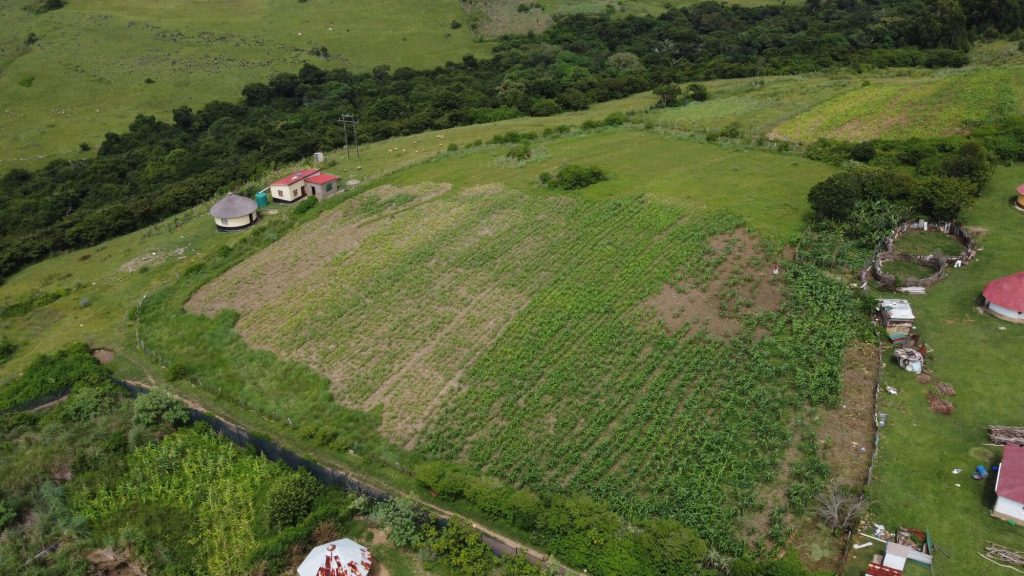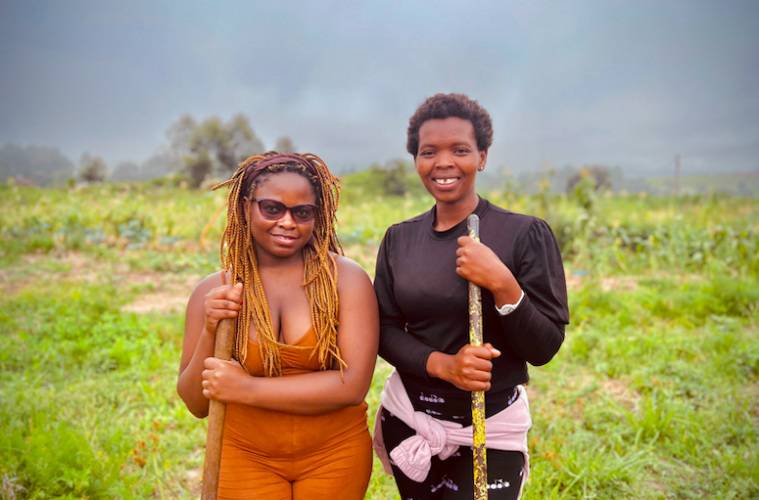In the heart of the Eastern Cape, where poverty, food insecurity, and unemployment persist, a beacon of hope shines through the endeavours of Neziswa Mlenzana, a passionate social entrepreneur.
Her journey with Greenvines, a women-led social enterprise, is a testament to the transformative power of social entrepreneurship in addressing food inequity, insecurity, and unemployment. Neziswa’s story serves as an inspiration and a call to action, demonstrating how entrepreneurs can unleash the potential to uplift communities and foster sustainable change.
Where Neziswa began
Neziswa’s childhood experiences in the Eastern Cape, witnessing the harsh realities of high unemployment and food insecurity, propelled her to seek a tangible positive difference.
She recognized the potential of self-sufficiency and food sovereignty in addressing these issues, sparking her passion for teaching agricultural skills and knowledge transfer.
Neziswa believed that by inspiring and empowering her community to farm sustainably, she could create economic opportunities, improve health outcomes, and cultivate a sense of unity.

Image credit: Unsplash
The birth of Greenvines
Driven by her determination, Neziswa embarked on her entrepreneurial journey. Starting with a backyard garden alongside her grandmother, she took the first step towards making her dream a reality.
Guided by her grandmother’s wisdom and traditional farming practices, Neziswa learned the importance of soil health and the value of organic production. This experience ignited her love for farming and the potential to uplift her community through grassroots agricultural economic development.
Skills development
Neziswa understood that developing her skills and knowledge was crucial to her success as a social entrepreneur. She pursued studies in Economics and Statistics, laying a strong foundation for her aspirations.
Eager to expand her expertise, she enrolled in Buhle Farmers Academy to gain valuable insights into vegetable production. Equipped with newfound knowledge, Neziswa was ready to take her entrepreneurial journey to the next level.
The Greenvines journey
In collaboration with like-minded individuals, Benson and Malizo, Neziswa seized an opportunity to expand her business. Utilizing vacant land near a river in eNgqeleni, they planted a substantial 1.5 hectares of butternut squash, creating employment opportunities for youth and women within the community.
Through strategic marketing and a commitment to quality, their produce gained popularity and found its way to local restaurants, hospitals, schools, and households.
Formalization and commitment:
Recognizing the need to formalize their efforts, Neziswa and her team registered ” Greenvines Agricultural Primary Co-operative Limited” in 2021.
With sustainability and environmental consciousness at the forefront, Greenvines became a symbol of carbon emission reduction and a greener economy. Through permaculture and agroecological farming systems, they protect and improve agricultural systems, adapting to climate extremes and stressors.
Greenvines focuses on soil health, minimal soil tillage, companion planting, mulching, and the utilization of organic alternatives such as vermicompost and worm tea.

Image credit: Unsplash
Expanding their horizons
Neziswa’s journey has not been one of solitary achievement but a testament to the power of collaboration and support.
Currently enrolled in a food system incubation program with Oribi, she aims to leverage the program’s resources to further unleash Greenvines’ potential.
Neziswa’s vision extends beyond the farm as she plans to create a permaculture route, promoting eco-tourism and showcasing the rich cultural heritage of Mpondo and Xhosa communities. Through training, workshops, and an authentic culinary experience, tourists will gain insights into traditional food, craft, and music.
Social entrepreneurship
Neziswa’s story exemplifies the transformative impact that social entrepreneurs can have on addressing food inequity, insecurity, and unemployment in South Africa. Her journey with Greenvines showcases the power of local solutions and grassroots movements in creating sustainable change. However, Neziswa’s story is just one example among many untapped potentials waiting to be unleashed.
To fully harness the potential of social entrepreneurs in South Africa, we must create an enabling environment that supports and nurtures their endeavours. Here are some key steps we can take:
- Foster entrepreneurial education: Investing in entrepreneurial education and training programs that equip aspiring social entrepreneurs with the skills and knowledge they need is vital. By providing access to resources, mentorship, and business development support, we can empower individuals like Neziswa to translate their ideas into impactful ventures.
- Promote collaboration and networking: Building networks and fostering collaboration among social entrepreneurs, government agencies, non-profit organizations, academia, and private sectors can create a powerful ecosystem for innovation and growth. Through partnerships, shared resources, and knowledge exchange, we can amplify the impact of social enterprises and accelerate the pace of change.
- Provide access to funding and financial support: Access to capital is often a significant barrier for social entrepreneurs. Establishing dedicated funds and financial support mechanisms specifically for social enterprises can help bridge this gap. By offering grants, loans, and impact investment opportunities, we can enable social entrepreneurs to scale their initiatives and reach more communities in need.
- Streamline regulatory processes: Simplifying and streamlining regulatory processes can alleviate the burden on social entrepreneurs, enabling them to focus more on their mission and impact. Reducing bureaucratic hurdles, offering tax incentives, procurement incentives dedicated to social enterprises and providing legal support can create a conducive environment for social enterprises to thrive.
- Raise awareness and recognition: Celebrating the achievements of social entrepreneurs and showcasing their impact can inspire others to follow suit. Creating platforms to share success stories, organizing events, and recognizing the contributions of social entrepreneurs can elevate their status, attract support, and inspire a new generation of changemakers.
In a recent plenary meeting, the UN made a significant stride towards promoting sustainable development through the adoption of a resolution titled ‘Promoting the Social and Solidarity Economy for Sustainable Development’.
This resolution garnered support and enthusiasm from various organizations, including Groupe SOS, which played a pivotal role by chairing the Permanent Secretariat of the Pact for Impact Alliance. Groupe SOS warmly welcomes this resolution as it aligns with its commitment to fostering social and economic transformation through initiatives like Neziswa’s inspiring story of Greenvines.
The resolution’s focus on empowering social entrepreneurs and supporting sustainable solutions resonates deeply with Groupe SOS’s mission, further igniting its dedication to creating a positive impact in communities around the world.
South Africa possesses a wealth of untapped potential in its social entrepreneurs, like Neziswa and her Greenvines initiative.
By unleashing their potential, we can address food inequity, insecurity, and unemployment sustainably and innovatively.
It is time to come together as a nation, embrace the spirit of entrepreneurship, and create an enabling environment where social entrepreneurs can flourish. Through collective efforts, we can unlock a brighter future for South Africa, where every individual has access to equal opportunities and resources to reach their fullest potential.
ALSO SEE:
Indigenous knowledge aided children to survive 40 days in the jungle
Feature image: Supplied


